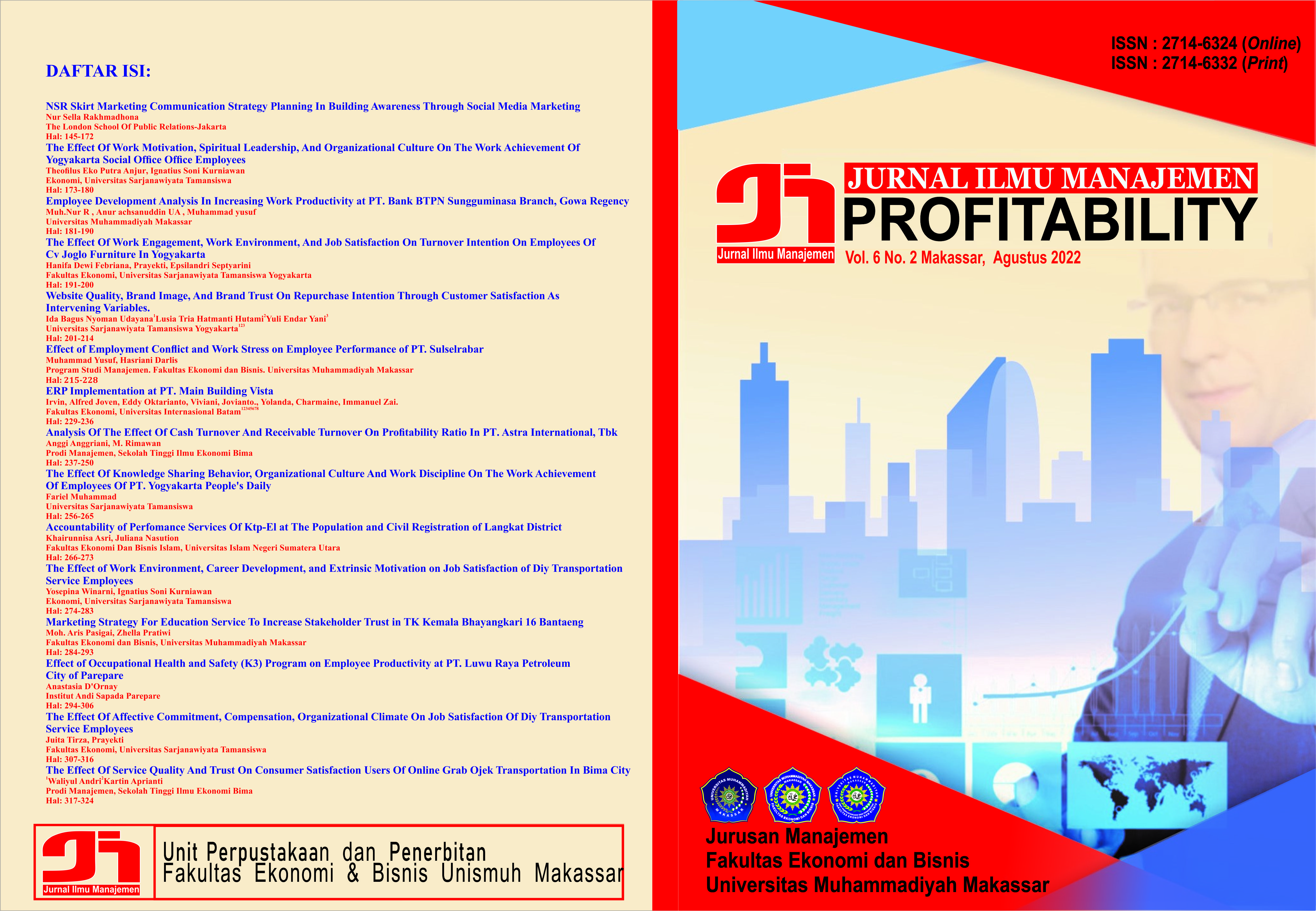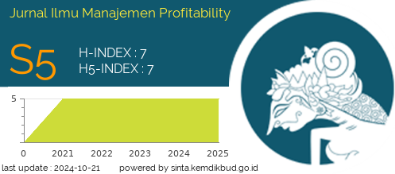The Influence of Organizational Justice, Organizational Culture and Job Satisfaction on Organizational Commitment of Employees of the Health Department of Gunungkidul District
DOI: https://doi.org/10.26618/xj4v1h08
Organizational Justice, Organizational Culture and Job Satisfaction to Organizational Commitment.
Abstract
This study examines the influence of organizational justice, organizational culture, and job satisfaction on organizational commitment among employees of the Gunungkidul Regency Health Office. Using a quantitative approach, data were collected from a saturated sample of 80 employees through structured questionnaires measured on a Likert scale. The research variables included organizational justice, organizational culture, job satisfaction, and organizational commitment, adopted from established measurement instruments. Data analysis was conducted using multiple linear regression with SPSS. The results demonstrate that organizational justice has a positive and significant effect on organizational commitment, indicating that fair treatment in terms of workload, income, and recognition enhances employees’ willingness to remain dedicated to the organization. Similarly, organizational culture exerts a significant positive impact, suggesting that shared norms, values, and teamwork contribute to stronger commitment. Job satisfaction also positively influences commitment, showing that satisfied employees with supportive work environments are more likely to remain loyal. Furthermore, the simultaneous testing confirms that organizational justice, culture, and job satisfaction collectively explain 35.1% of the variance in organizational commitment, while the remaining 64.9% is attributed to other factors outside the study. The findings underscore the importance of promoting fairness, strengthening organizational culture, and ensuring job satisfaction to sustain employee commitment. This study contributes to the organizational behavior literature and provides practical recommendations for public institutions to enhance human resource management strategies in health sector organizations
References
Angel and Edalmen. (2022). The effect of load, stress, and job satisfaction on organizational commitment. Journal of Managerial and Entrepreneurship, 04.
grace and siti. (2021). The Effect of Organizational Culture, Organizational Justice and Work Environment on Organizational Commitment of Employees of PT Siegwerk Indonesia Surabaya. Journal of Sustainability Business Research. https://doi.org/https://doi.org/10.36456/jsbr.v2i1.3432
Ellys, E., & Ie, M. (2020). The effect of job satisfaction and organizational culture on employee organizational commitment. Maranatha Management Journal, 20(1), 75-84. https://doi.org/10.28932/jmm.v20i1.3026
Ependi, N. H., & Sudirman, S. (2021). The Effect of Organizational Culture and Trust on Organizational Commitment. Journal of Education Science (JIP) STKIP Kusuma Negara, 12(2), 172-181. https://doi.org/10.37640/jip.v12i2.858
Erninawati. (2021). The influence of organizational culture and job satisfaction on employee organizational commitment at PT Carmin Maju Bersama Indonesia. https://doi.org/http://repository.upbatam.ac.id/id/eprint/869
Heridiansyah, J., Susetyarsi, T., Setiyanti, S. W., Meilinda, A. D., Semarang, S., Key, K., Organization, B., Work, K., Organization, K., & Organization, K. (2024). The influence of organizational culture, job satisfaction and organizational justice on organizational commitment in Kelurahan employees in Gajahmungkur Semarang District. Journal of STIE Semarang, 16. https://doi.org/https://doi.org/10.33747/stiesmg.v16i3.739
Kurniawan I and Andre. (2022). Strengthening organizational commitment: the role of organizational culture, distributive justice and procedural justice. Journal of Management, 12, January-June. https://doi.org/https://doi.org/10.30656/jm.v12i1.3497
Khaliza, S., Setiawan, T., & Fahlevi, A. (2022). The Effect of Procedural and Distributive Justice on Organizational Commitment as a Mediating Variable of PT. Pioneerindo Gourmet International Tbk (CFC). https://journal.cattleyadf.org/index.php/Jasmien
Lutfiana, N. Z., Anandita, S. R., & Mahendri, W. (2023). The Effect of Training and Occupational Safety and Health (K3) on Organizational Commitment of Jombang Regency Fire Department Personnel. Business and Economic Publication, 1(2), 70-79. https://doi.org/10.32764/bep.v1i2.1020
Maria Yunita et al. (2024). The Effect of Competence and Compensation on Organizational Commitment and its Implications for Job Satisfaction. Manuhara Journal: Management and Business Science Research Center, 2(4), 346-354. https://doi.org/10.61132/manuhara.v2i4.1259
Octavianus and Kadek. (2020). Journal of Management and Business Studies The Effect of Organizational Justice, Organizational Culture, and Job Satisfaction on Organizational Commitment at the Gianyar Regency Cultural Office. In JSMB (Vol. 7, Issue 2). https://doi.org/https://doi.org/10.21107/jsmb.v7i2.9299
Robbins, S.P., & Judge, T.A. (2018). Organizational Behavior (12th ed.) Pearson Education.
Septyarini et al. (2024). Influence Of Organizational Fairness, Organizational Culture and Job Satisfaction On Organizational Commitment. Journal of Business and Management Review, 5(7), 536-552. https://doi.org/https://doi.org/10.47153/jbmr.v5i7.1023
Suhartini, N. (2024). The effect of organizational justice, organizational culture and job satisfaction on employee organizational commitment at the Immigration class 1 Non TPI Serang office. Journal of Management, 3. https://doi.org/https://doi.org/10.30656/jumpa.v3i1.8698
Tamam et al. (2023). The Influence Of Organizational Justice, Organizational Culture And Job Sarisfaction On Organizational Commitment In The Metro City Regional Secretariat. Kalianda Halok Gagas, 5(2), 150-163. https://doi.org/10.52655/khg.v5i2.58
Teduh Riawan and Sudibya. (2019). The effect of organizational justice, organizational culture and job satisfaction on organizational
Downloads
Published
Issue
Section
License
Authors who publish with Jurnal Ilmu Manajemen Profitability agree to the following terms:
Copyright of the articles remains with the authors.
Authors grant the journal the right of first publication with the work simultaneously licensed under a Creative Commons Attribution-NonCommercial 4.0 International License (CC BY-NC 4.0). This license allows others to:
Share (copy and redistribute the material in any medium or format)
Adapt (remix, transform, and build upon the material)
as long as they give appropriate credit to the original author(s) and source, provide a link to the license, and indicate if changes were made. Non-commercial use only.
Authors are permitted to:
Distribute their published work (e.g., post it to an institutional repository or publish it in a book), with an acknowledgment of its initial publication in this journal.
Enter into separate, additional contractual arrangements for the non-exclusive distribution of the journal’s published version of the work (e.g., post it to a class website or institutional archive).
For permissions to use the content published in this journal beyond the scope of the license (e.g., commercial purposes), please contact the editorial office via the journal email.
License Details:
This journal is licensed under a Creative Commons Attribution-NonCommercial 4.0 International License (CC BY-NC 4.0).












